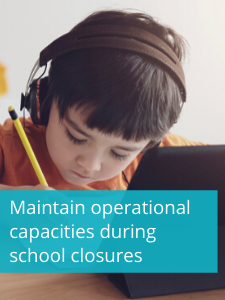Five steps to support education for all in the time of COVID-19
This article is part of a collection of blog posts related to the education in emergencies response to COVID-19.
Practical guidance for countries – including their teachers, learners, and families – on managing this crisis, and learning from it for the future.
Courtesy of UNESCO-IIEP, original article published on 9 April 2020
 The COVID-19 pandemic is taking a heavy toll on people’s health, lives, and societies. Less visible, but no less worrying, is the price that children and youth all over the world will pay in terms of education. School closures, confinement, and psychological distress will have serious consequences on their futures and well-being, as well as on those of their teachers and families.
The COVID-19 pandemic is taking a heavy toll on people’s health, lives, and societies. Less visible, but no less worrying, is the price that children and youth all over the world will pay in terms of education. School closures, confinement, and psychological distress will have serious consequences on their futures and well-being, as well as on those of their teachers and families.
Securing quality education for all and making sure that the most vulnerable are not left behind is the responsibility of every government, and this is a major challenge in a crisis situation. What can countries do to ensure #LearningNeverStops? What roles do teachers and learners play? How can advanced planning help education systems prepare for the next steps?
Based on the research and technical expertise gathered over decades of working with governments, including capacity development support, IIEP experts have put together some recommendations that will hopefully be of help and inspiration in these difficult times.
You will find below five short documents that not only summarize in practical terms what can be done to address some of the challenges confronting countries – as well as teachers, learners, and their families – when it comes to managing such a crisis, but also draw lessons from the situation and provide guidance on planning and preparing for future crises.
 |
 |
 |
 |
 |
We welcome your suggestions on how to navigate through these challenging times. Please feel free to send your experiences to: [email protected]
The views expressed in this blog are the author's own.



